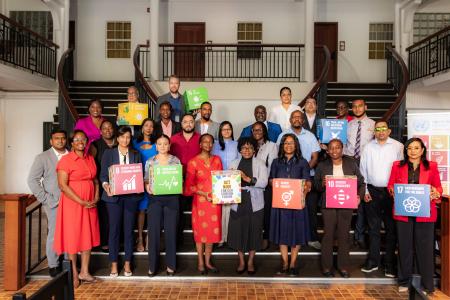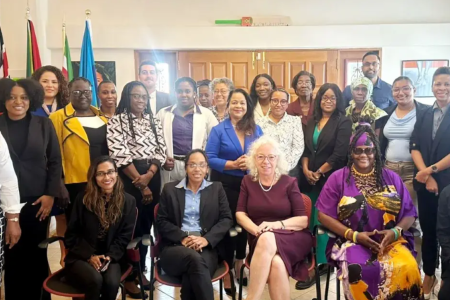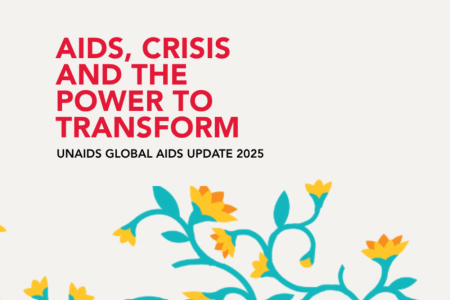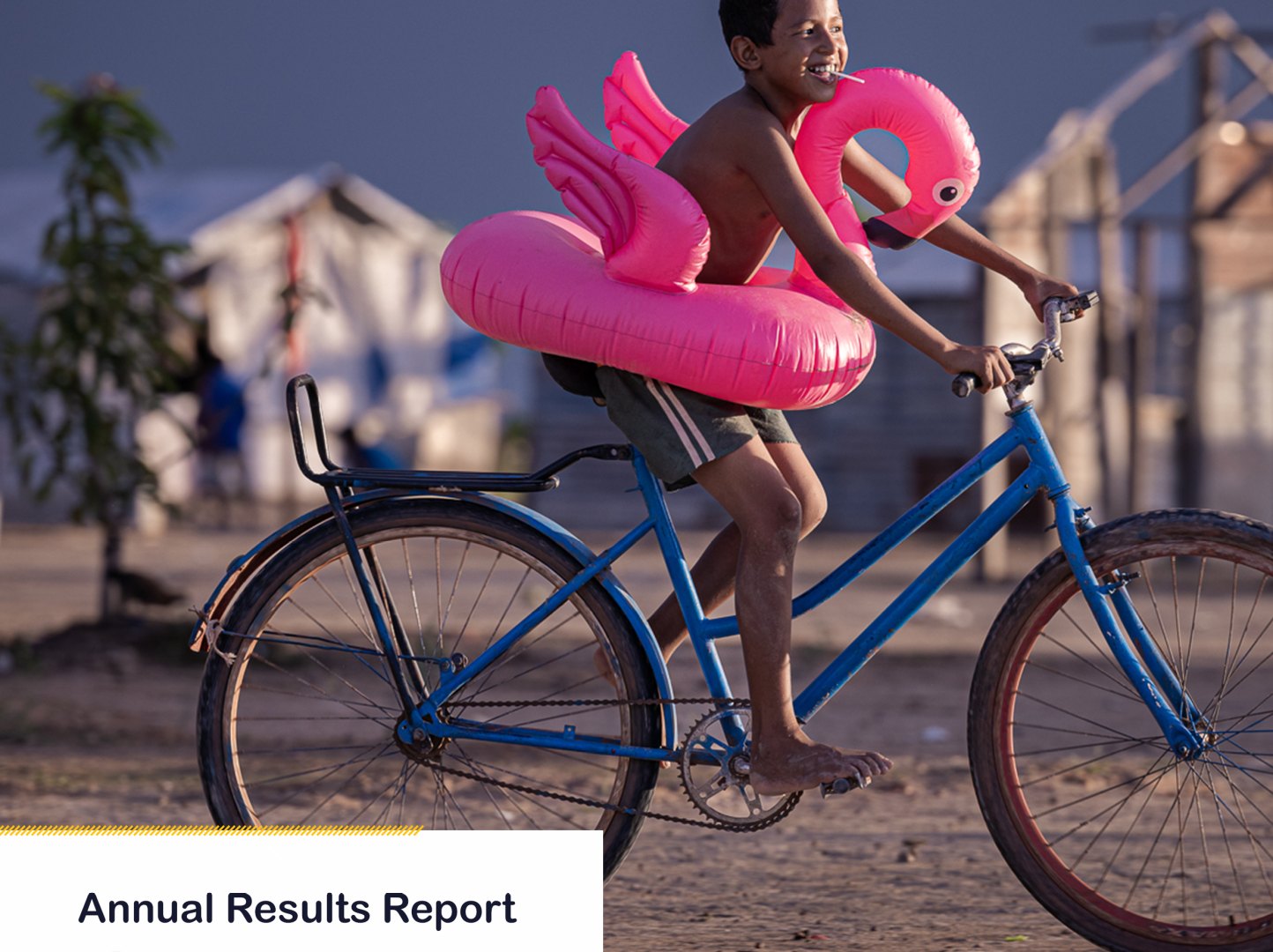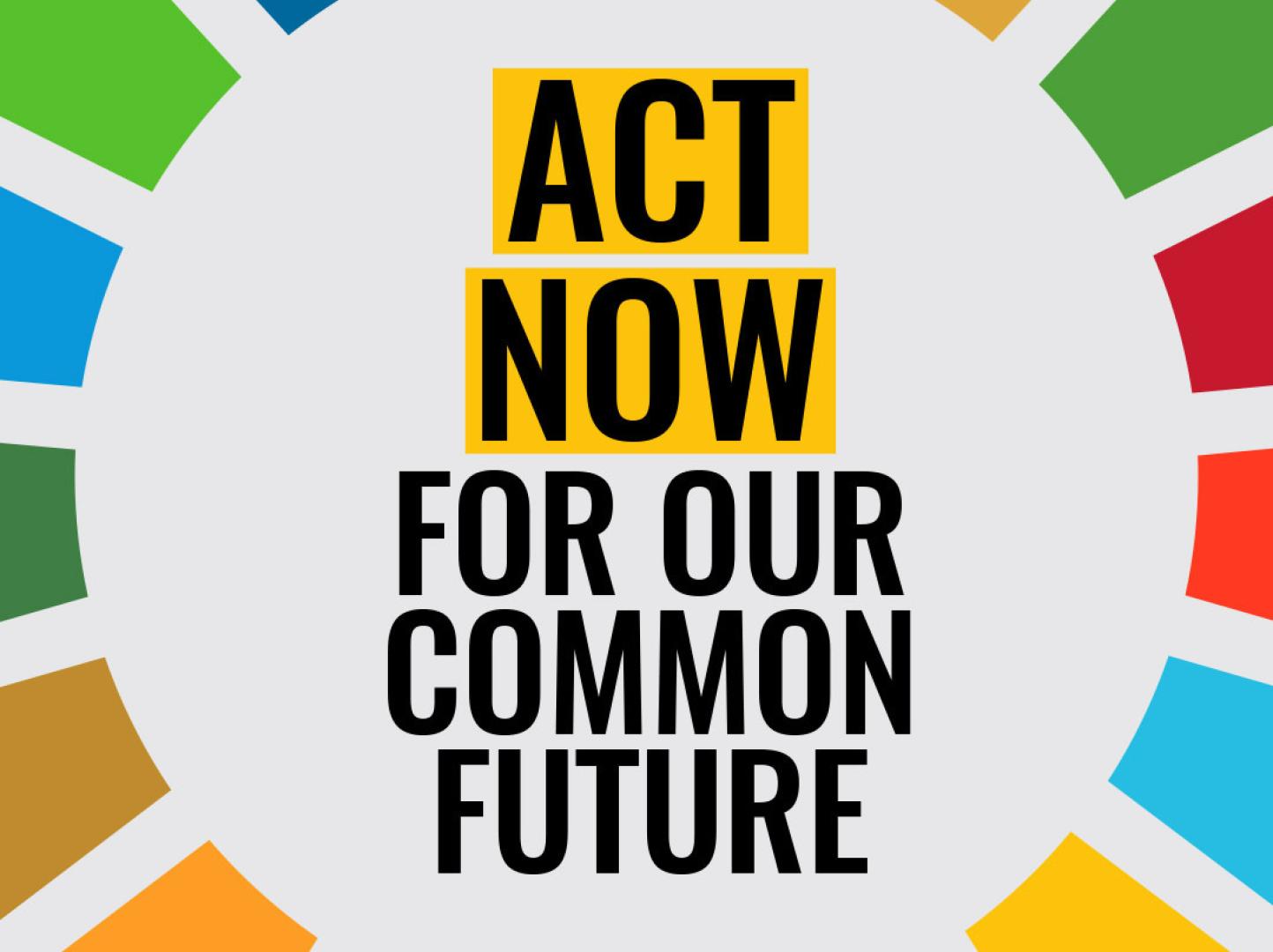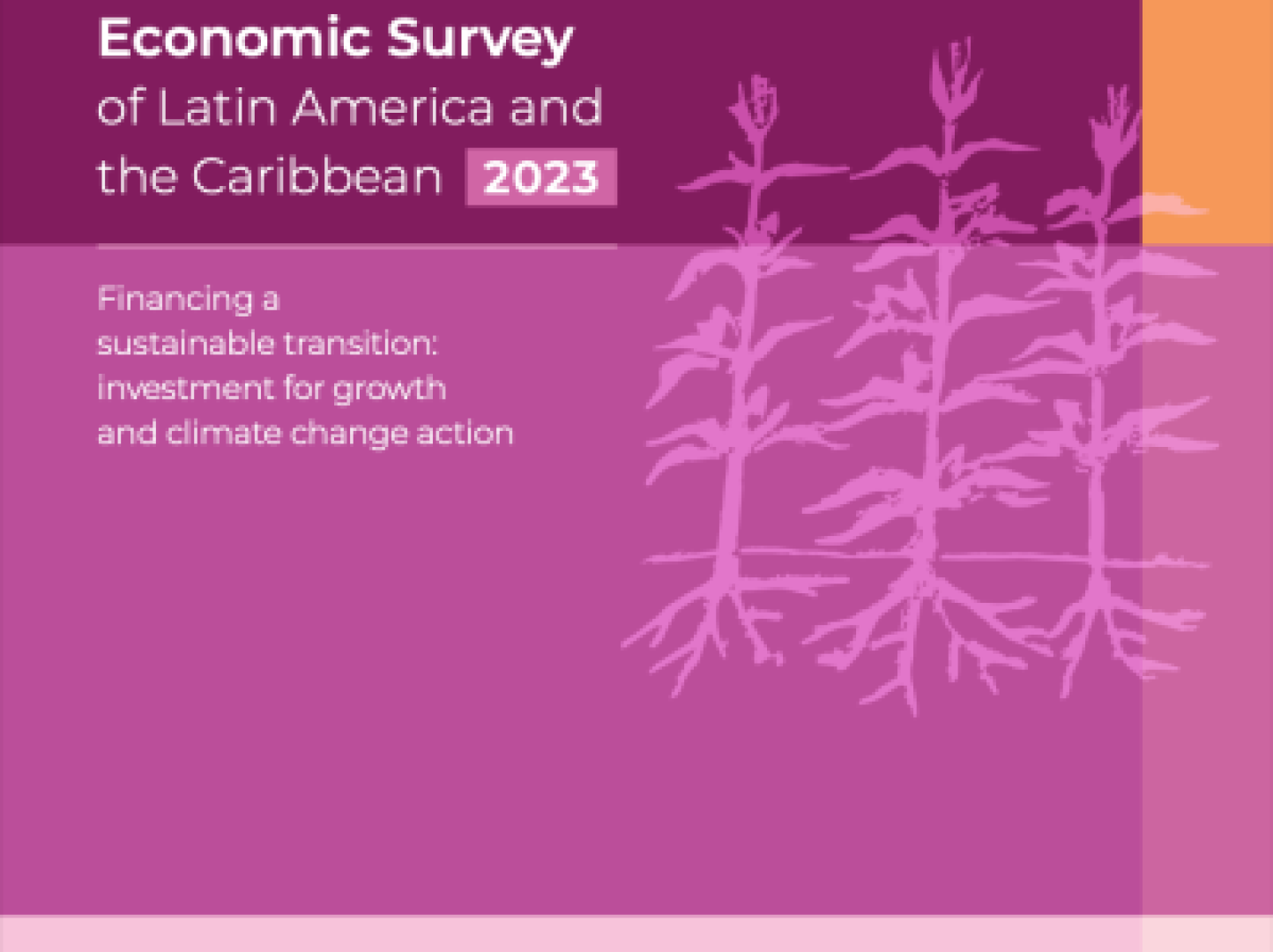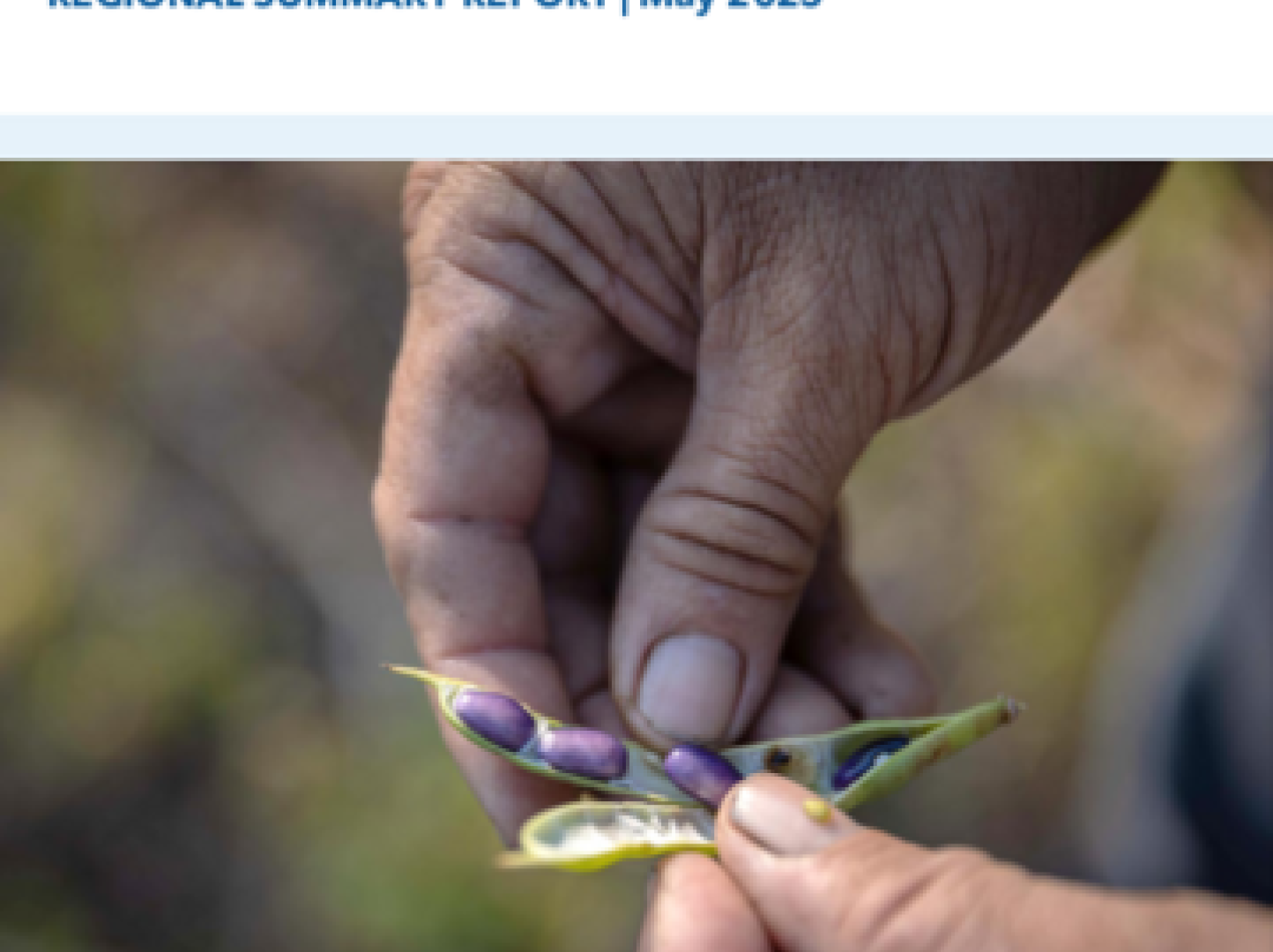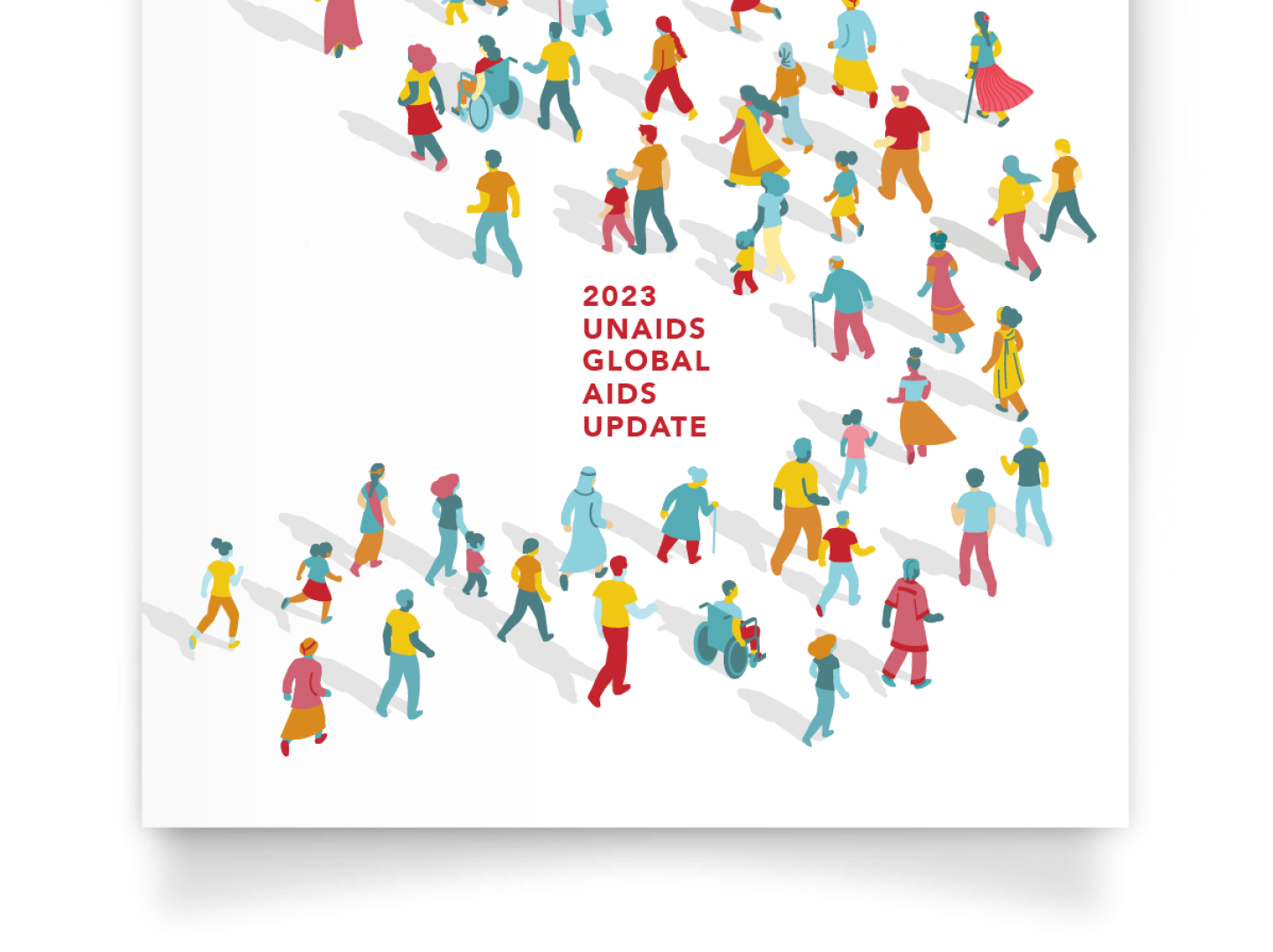Latest
Story
10 July 2025
Caribbean leads the world in reducing AIDS-related deaths globally, but progress on reducing new infections slow
Learn more
Story
25 June 2025
Private Sector Sustainable Development Forum Convenes in Guyana to Advance SDGs Alignment
Learn more
Story
23 June 2025
Civil Society Dialogue Builds Momentum for Women, Peace and Security Agenda in Guyana
Learn more
Latest
The Sustainable Development Goals in Guyana
The Sustainable Development Goals are a global call to action to end poverty, protect the earth's environment, and ensure that people everywhere can enjoy peace and prosperity.
Kindly note that the data visualizations show an aggregate of the Caribbean. To view the disaggregated data for Guyana, please select it from the dropdown menu.
Video
06 February 2024
Programme - Guyana's role on the UN Security Council
In January 2024 Guyana assumed its seat as an elected member of the United Nations Security Council for a two-year term 2024-2025.
Mr. Robert Persaud, Guyana's Foreign Secretary and High Representative for Guyana's UN Security Council Affairs and Yeşim Oruç, UN Resident Coordinator discussed the importance of Guyana's role on the Security Council.
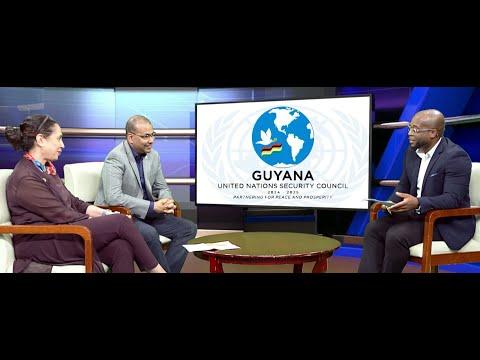
Story
10 July 2025
Caribbean leads the world in reducing AIDS-related deaths globally, but progress on reducing new infections slow
Kingston, July 10, 2025—Data from the latest Global AIDS Update Report, released by UNAIDS, shows the Caribbean recorded a 62% reduction in AIDS-related deaths, between 2010 and 2024, the steepest decline among eight regions globally. According to the report—AIDS, Crisis and the Power to Transform, over the last fifteen years, there has been a 54% decline in AIDS-related deaths globally. The Caribbean is well above the global average at 62%. The report credits the widespread availability of anti-retroviral treatment (ART) for the progress made since 2010. Reductions have also been recorded in West & Central Africa (60%), Eastern & Southern Africa (59%), Asia & the Pacific (53%), Western & Central Europe and North America (48%), Latin America (31%) and the Middle East & North Africa (6%) while Eastern Europe & Central Asia reported a 48% increase over the same period.UNAIDS commended governments, communities of people living with and most affected by HIV, and key partners, including PEPFAR and The Global Fund, among others for the progress made across the region. “The Caribbean’s stellar performance and achievements are commendable. It shows the resilience of a region constrained by a myriad of social, economic and other challenges such as high debt, declining external funding, and natural disasters and how critical political leadership is to safeguard people’s health without distinction,” Dr Richard Amenyah, the Director of UNAIDS Multi-Country Office in the Caribbean said. “Despite the ongoing challenges, the Caribbean continues to show that great things can be achieved when governments and all stakeholders, including people living with HIV and key populations, work together to protect and promote good health and well-being,” Amenyah said. In 2010, only 53,000 people living with HIV were on treatment in the Caribbean. 13,000 adults and children lost their lives due to AIDS-related conditions that year. However, by 2024, this number climbed to 250,000 people on treatment—with 50,000 of them added between 2020 and 2024. Today, 85% of people living with HIV in the Caribbean know their status, 74% are on treatment, and 66% are virally suppressed (up from 33% in 2017). Last year, deaths declined to 4,800 deaths (down from 6,100 people in 2020).While the organisation applauds stakeholders for the progress in reducing AIDS-related deaths, UNAIDS said it is concerned about the rate of decline in new infections across the region. Noting that the progress is insufficient to reach the targets to end AIDS, UNAIDS urged political leaders, healthcare workers and other stakeholders to do more to prevent new HIV infections.Globally, new HIV infections have been reduced by 40% since 2010 but only 21% of new infections have been reduced in the Caribbean. In 2024, there were 15,000 new infections with Haiti, the Dominican Republic, Cuba, and Jamaica accounting for 90% (Haiti contributed 38%) and young people (15–24 years) account for 25% of new infections overall. UNAIDS’ new report emphasizes integrating HIV into broader health systems, strengthening partnerships with CSOs and communities, and addressing social determinants like stigma and discrimination to prevent new HIV infections, especially among young people and key populations and prevent treatment interruptions. Caribbean governments are also being encouraged to take greater ownership to navigate geopolitical funding shifts, ensuring financial and programmatic sustainability to achieve the 2030 goal of ending AIDS. Noting that domestic funding for the HIV response moved from 30% in 2023 to 38% in 2024, UNAIDS said more needs to be done to achieve the internationally agreed targets to end AIDS as a public health threat. “Governments must continue to prioritize increasing domestic resources, integrate HIV into broader health systems, innovate to keep people living with HIV on treatment toward achieving viral suppression and ensure equitable access for young people and key populations to prevent new infections. Only through sustained partnership and greater country ownership can we end AIDS as a public health threat by 2030 in the region,” Amenyah said.Get more information on the region by accessing the Global AIDS Update 2025: Regional profile for the Caribbean ******ContactUNAIDS Caribbean | Jaevion Nelson | tel. +1 876 459 3211 | nelsonj@unaids.org UNAIDSThe Joint United Nations Programme on HIV/AIDS (UNAIDS) leads and inspires the world to achieve its shared vision of zero new HIV infections, zero discrimination and zero AIDS-related deaths. UNAIDS unites the efforts of 11 UN organizations—UNHCR, UNICEF, WFP, UNDP, UNFPA, UNODC, UN Women, ILO, UNESCO, WHO and the World Bank—and works closely with global and national partners towards ending the AIDS epidemic by 2030 as part of the Sustainable Development Goals. Learn more at unaids.org and connect with us on Facebook, Twitter, Instagram and YouTube.
1 of 5
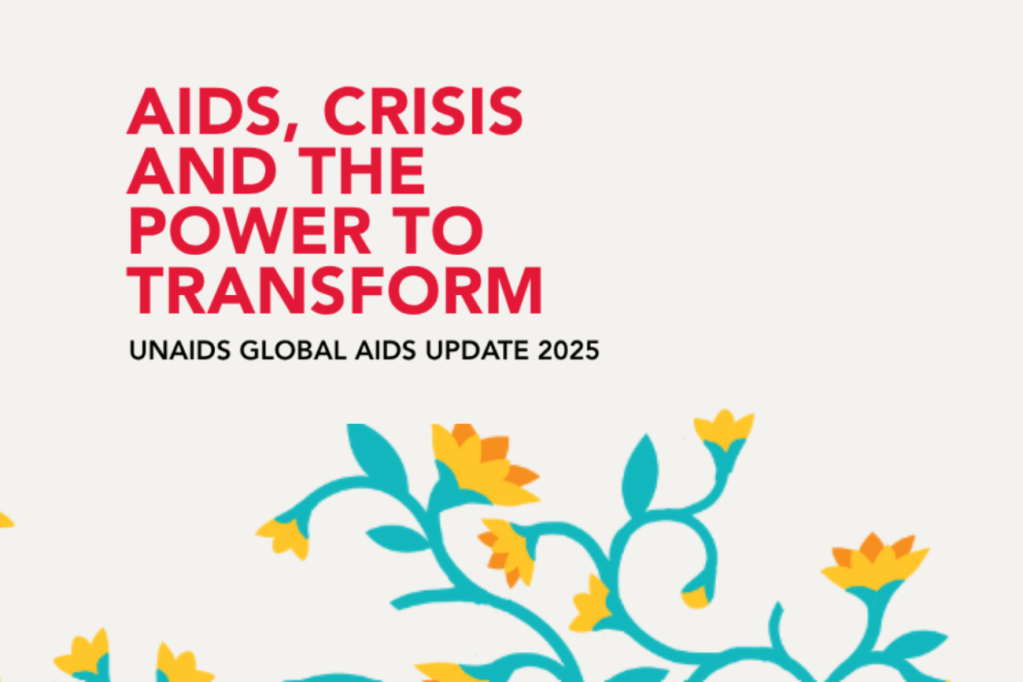
Story
25 June 2025
Private Sector Sustainable Development Forum Convenes in Guyana to Advance SDGs Alignment
The half-day Forum, aimed at advancing corporate alignment with the Sustainable Development Goals (SDGs) in Guyana, was hosted by the United Nations in Guyana, in collaboration with the UN Global Compact Network Caribbean and the Georgetown Chamber of Commerce and Industry (GCCI). It brought together close to 30 participants, including business leaders, policymakers, and development partners. Participants engaged in strategic dialogue on the role of private enterprise in building inclusive, sustainable economies through responsible business conduct.The event is part of efforts to operationalise the UN-GCCI Joint Declaration of Intent and to raise awareness of how businesses - especially Micro, Small and Medium Enterprises (MSMEs) - can align operations with global standards such as the Ten Principles of the UN Global Compact, the Women’s Empowerment Principles (WEPs), the Children’s Rights and Business Principles, and the UN Guiding Principles on Business and Human Rights.Kathy Smith, President, Georgetown Chamber of Commerce and Industry reaffirmed the importance of aligning local businesses with global ethical standards, highlighting the Chamber’s code of conduct and its commitment to inclusivity. She emphasized GCCI’s ongoing support for key populations and commended the government’s active role in Sustainable Development Goal (SDG) reviews and partnerships with the United Nations. Jean Kamau, UN Resident Coordinator, highlighted the pivotal role of the private sector in implementing the Pact for the Future and advancing the SDGs. “Through responsible investment, inclusive business models, and sustainable supply chains, the private sector can help translate the Pact’s vision into tangible results. In doing so, businesses contribute not only to global development, but to long-term market stability, resilience, and shared prosperity,” she said.She added that by aligning operations with the SDGs, integrating Environment, Social and Governance principles, and partnering with the United Nations and other development actors, businesses in Guyana can ensure that this era of prosperity translates into long-term, people-centered development that leaves no one behind.Kyana Bowen, Executive Director of the UN Global Compact Network Caribbean said, “The Private Sector Sustainable Development Forum marks a pivotal step in deepening the Caribbean business community’s engagement with the Sustainable Development Goals. Here in Guyana, we see strong momentum among companies eager to integrate responsible business practices that respect human rights, advance gender equality, and build climate resilience. The UN Global Compact Network Caribbean is proud to support this collective journey—because when business aligns with sustainability, everyone benefits.” In addition to spotlighting existing good practices among UN Global Compact member companies, the Forum highlighted UN programme initiatives that are actively engaging the private sector to create sustainable development outcomes. Agencies including UNICEF, UNDP, UN Women, UNFPA, and IFC, World Bank Group presented concrete opportunities for collaboration in areas such as youth employment, women’s economic empowerment, climate resilience, and social protection. In breakout sessions, participants explored how SDG principles can be embedded across supply chains, workforce strategies, and community investment. Inclusive participation was a central focus, with representation from enterprises owned or led by women, youth, Indigenous Peoples, and persons with disabilities.The UN Global Compact is the world’s largest corporate sustainability platform, with over 25,000 participating companies in more than 160 countries. The Caribbean Network currently includes 51 participants, four of which are based in Guyana. The GCCI, the country’s leading business support organization, represents nearly 1,000 member companies.The Forum concluded with a call for stronger multi-stakeholder partnerships and an invitation to Guyanese businesses to join the UN Global Compact and commit to driving sustainable, inclusive growth.
1 of 5
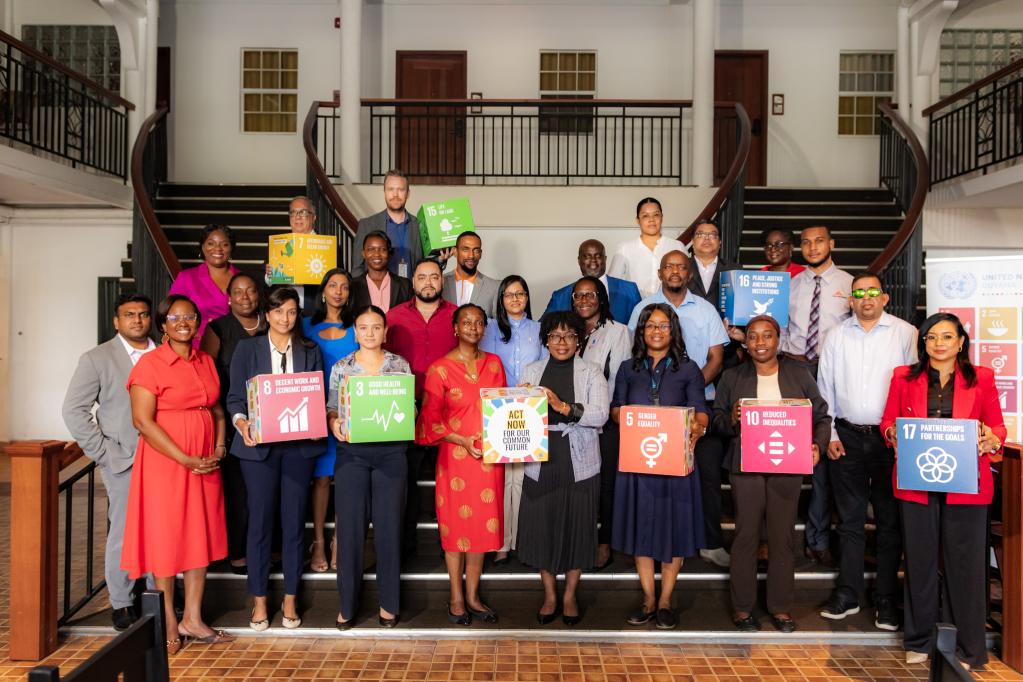
Story
23 June 2025
Civil Society Dialogue Builds Momentum for Women, Peace and Security Agenda in Guyana
Civil society organisations across Guyana came together for a dialogue hosted by the British High Commission in partnership with UN Women to explore how the Women, Peace and Security (WPS) agenda can be meaningfully applied within the Guyanese context. The WPS approach can be seen as a blueprint for preventing societal conflict and crises, including addressing violence against women and girls which is occurring at alarming levels across the Caribbean. Prevalence data across five Caribbean countries depicts that on average 46 per cent of women have experienced at least one form of violence in their lifetime. The session aimed to further identify key entry points for the WPS agenda in Guyana, support movement building, and inform the development of a locally driven roadmap for NGO and CSO engagement.The half-day hybrid session brought together representatives from women’s organisations, youth groups, and community leaders, as part of a broader series of engagements to localise the WPS agenda and contribute to Guyana’s future National Action Plan on WPS.The dialogue was also strategically scheduled to coincide with Guyana’s presidency of the United Nations Security Council (UNSC), which in part focuses on advancing the Women, Peace and Security agenda. By aligning local engagement with Guyana’s global leadership role, the event sought to build national momentum for WPS and emphasise the importance of inclusive, community-driven action in support of international peace and security commitments.The session opened with welcome remarks from Her Excellency Jane Miller, British High Commissioner; Ms. Isiuwa Iyahen, Head of Office a.i., UN Women Multi-Country Office (MCO) – Caribbean; and Jean Njeri Kamau, UN Resident Coordinator in Guyana. Their remarks underscored the importance of grounding WPS priorities in inclusive dialogue and community consultation.British High Commissioner Miller noted, “This was an important next step in the WPS journey for Guyana. The agenda is wide-reaching and touches on many different issues, which is why hearing directly from civil society is so important. Their input is essential to making this process meaningful and grounded in the realities people face every day.”Ms. Isiuwa Iyahen, Head of Office a.i. UN Women MCO – Caribbean said through the WPS approach, women have been empowered to take leadership roles in community policing, peacebuilding initiatives, and criminal justice systems; contributing to shaping policies that promote safety and security for all.“The discussions are designed to facilitate meaningful conversations that align the WPS agenda with the lived experiences of individuals in Guyana. We explored key human rights issues and the impact of crime and violence on various communities. We must ask ourselves: Who is most affected by these challenges? What are the root causes of conflict and insecurity in our neighborhoods? By understanding these dynamics, we can begin to identify effective strategies for prevention and intervention.”The morning featured a series of presentations and discussions by Je’nille Maraj, UN Women Planning and Coordination Specialist, who provided an overview of WPS in the Caribbean, highlighting regional progress and opportunities for Guyana. Akilah Dorris, UN Women Planning and Coordination Specialist based in Guyana, addressed civil society engagement in the context of this milestone year of the 30th anniversary of the Beijing Declaration and Platform for Action, the cornerstone of the women’s rights framework, focusing on leadership, participation, and social norms.Participants then engaged in a roundtable session themed “Aligning the WPS Agenda to Lived Experience.” Drawing on insights from a pre-event survey, attendees reflected on how WPS could address priority issues in their communities and shape more gender-responsive peace and security policies.A WPS National Action Plan (NAP) is a strategic framework designed to implement the United Nations Security Council Resolution 1325, which calls for the protection and inclusion of women in peace and security efforts. These frameworks offer countries the opportunity to strengthen institutional responses, tackle gender-based violence, and ensure that women are actively engaged in decision-making and crisis recovery.The event marks another step in building momentum toward a nationally owned WPS agenda for Guyana, grounded in the principles of inclusion and gender equality. The perspectives shared will contribute to the design of a Guyana-specific roadmap that reflects both national realities and international commitments.
1 of 5
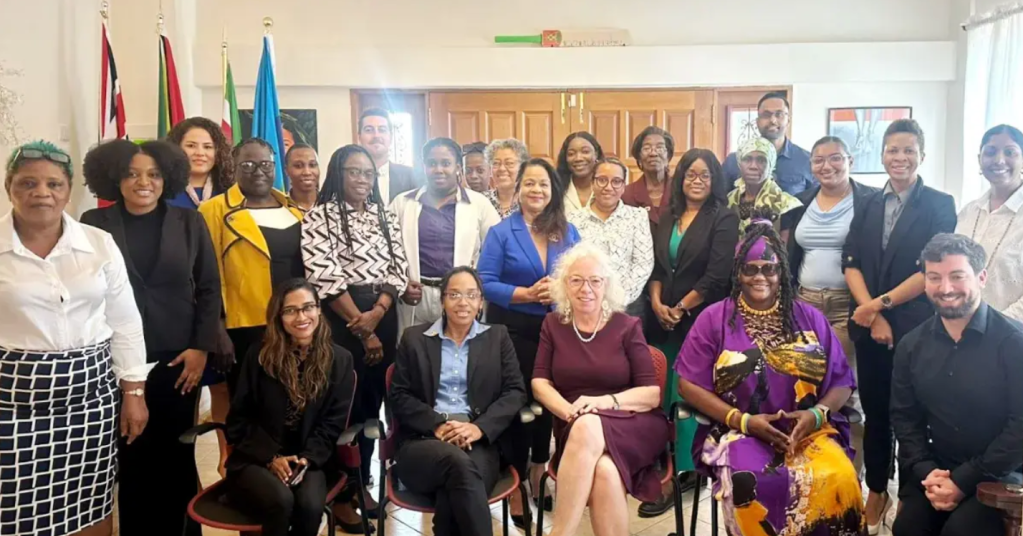
Story
26 May 2025
United Nations Guyana emphasises ethical use of Artificial Intelligence and digital inclusion at Caribbean Media Summit
The summit brought together journalists, media practitioners, policy experts and representatives of regional and international organisations to address the theme, “Evolving Media Business Models in Turbulent Times.”Delivering a keynote presentation on behalf of the United Nations system, Dr. Paul Hector, Officer in Charge and Advisor for Communication and Information in the UNESCO Regional Office for the Caribbean, emphasised the need to align the deployment of artificial intelligence (AI) with the principles of equity, transparency and the public interest. Drawing on the Caribbean Artificial Intelligence Policy Roadmap, he outlined a forward-looking vision for the ethical governance of AI, including safeguards to protect journalistic integrity, media viability, and fundamental rights.The participation of the United Nations system in Guyana in the Media Summit occurs against the backdrop of the recently adopted Global Digital Compact, which was endorsed at the 2024 Summit of the Future. The Compact reaffirms the commitment of Member States to a human-centred digital transformation and emphasises the need to bridge digital divides, promote inclusive access, and foster trust in digital technologies. In this context, the Caribbean region’s leadership in developing policy frameworks grounded in ethics and inclusion is both timely and instructive.Speakers at the summit emphasised the transformative impact of AI on newsrooms, business models, and public communication. They drew attention to the risks posed by algorithmic bias, misinformation, and digital monopolies while highlighting the opportunities that AI presents to strengthen investigative journalism and diversify content.Within this framework, Dr. Hector reiterated the importance of building institutional and individual capacities to meet the challenges of digital transformation. He referenced the upcoming UNESCO Conference on Capacity Building on AI and Digital Transformation in the Public Sector, to be held in June 2025, as a key platform for training public officials and aligning digital governance with the Sustainable Development Goals (SDGs).The Caribbean Artificial Intelligence Policy Roadmap, developed in consultation with multi-stakeholder partners, including national governments, civil society, and academic institutions, promotes inclusive innovation and responsible AI use across the public and private sectors. It highlights three strategic priorities: (1) strengthening digital competencies and media literacy, (2) ensuring fairness and accountability in AI systems, and (3) advancing regional cooperation in digital policy-making.Dr. Hector also referenced recent publications, including Reporting on Artificial Intelligence: A Handbook for Journalism Educators, and Guidelines for the Governance of Digital Platforms, as tools to support independent journalism and democratic discourse in the age of automation.In line with the objectives of the Global Digital Compact, the United Nations system in Guyana will continue to support partners in building resilient, rights-based digital ecosystems. For more information:Caribbean Artificial Intelligence Policy Roadmap
Reporting on Artificial Intelligence: A Handbook for Journalism Educators: https://www.unesco.org/en/articles/reporting-artificial-intelligenceUNESCO Digital Competency Framework for the Civil Service
UN Global Digital Compact
Guidelines for the Governance of Digital Platforms
Reporting on Artificial Intelligence: A Handbook for Journalism Educators: https://www.unesco.org/en/articles/reporting-artificial-intelligenceUNESCO Digital Competency Framework for the Civil Service
UN Global Digital Compact
Guidelines for the Governance of Digital Platforms
1 of 5
Story
06 May 2025
Guyana signs third Decent Work Country Programme
On 7 April 2025, the Government of Guyana, alongside the International Labour Organization (ILO) and national social partners, signed the country’s third Decent Work Country Programme (DWCP). This agreement aims to advance job creation, workers’ rights, social protection, and social dialogue, and is aligned with Guyana’s national development goals.The DWCP outlines three strategic priorities:Priority 1: Strong and representative tripartite constituents and effective social dialogue;Priority 2: Rights at work and employment and social protection for all; andPriority 3: Inclusive labour markets and sustainable enterprise development for decent work.Aligned with Guyana’s Low Carbon Development Strategy and the United Nations Sustainable Development Goals (SDGs), the programme focuses on creating decent jobs, particularly in emerging sectors such as the green and digital economies. It aims to support the country’s transition toward a more resilient, inclusive, and sustainable future.The signing ceremony marked a significant step forward in Guyana’s ongoing commitment to promoting decent work for all. The DWCP will guide national efforts over the next five years to strengthen the labour market and ensure social justice through tripartite collaboration.Minister of Labour, Hon. Joseph Hamilton, expressed appreciation to the ILO for its continued support: “With their unwavering assistance, we successfully developed and implemented two previous DWCPs, along with other initiatives that have positively impacted industrial relations, occupational safety and health, recruitment and placement services, and technical training opportunities for young people entering the workforce.”Mr. Lincoln Lewis, General Secretary of the Guyana Trades Union Congress (GTUC), welcomed the signing, acknowledging the journey leading to this achievement: “The Guyana Trades Union Congress (GTUC) is encouraged that while over the years we were confronted with challenges, the ILO continued a constant process of facilitation, today realized in a decent work programme. We look forward to the commitment from all parties for the realization of the respective goals.”Mr. Carvil Duncan, President of the Federation of Independent Trade Unions of Guyana (FITUG), also underscored the programme’s relevance: “The signing of the DWCP marks a significant and hopeful milestone for our nation's workers. As we navigate these exciting times filled with remarkable economic transformation, we recognize the profound impact this has on the lives of individuals and families throughout Guyana. The DWCP is more than just a programme; it offers a vital foundation for our workers and their loved ones to actively participate in the growth of our nation. Together, we can build a sustainable future that uplifts every Guyanese, ensuring that no one is left behind during this journey of progress.”Mr. Charles Ogle, Chief Executive Officer of the Consultative Association of Guyanese Industry (CAGI), highlighted the business community’s support for the initiative: “The launch of the third DWCP reinforces our shared commitment to a modern, inclusive, and productive labour market. Employers welcome this tripartite effort to strengthen social dialogue and enterprise development, especially as Guyana positions itself for growth in new sectors like green and digital industries. We remain committed to fostering decent work environments that support innovation, competitiveness, and sustainable economic progress for all.”The programme was signed by Dr. Joni Musabayana, Director of the ILO Decent Work Team and Office for the Caribbean, who emphasized the importance of the tripartite approach: “This signing represents more than a document—it reflects a shared vision for Guyana’s future. With tripartite commitment and action, we can ensure that economic growth goes hand-in-hand with workers’ rights, expanded opportunities, and social justice.”The event was witnessed by the Honourable Brigadier (Ret’d) Mark Anthony Phillips, Prime Minister of the Cooperative Republic of Guyana, and His Excellency Gilbert F. Houngbo, Director-General of the ILO, who was in Guyana for the 13th ILO Meeting of Caribbean Ministers of Labour. This article was first published on the ILO website.
1 of 5

Press Release
06 May 2025
Guyana’s human rights record to be examined by Universal Periodic Review
Guyana is one of 14 States to be reviewed by the UPR Working Group during its upcoming session from 28 April to 9 May 2025. The first, second and third UPR reviews of Guyana took place in May 2010, January 2015 and January 2020, respectively.The UPR Working Group is comprised of the 47 Member States of the Human Rights Council. However, each of the 193 UN Member States can participate in a country review.The documents on which the reviews are based are: 1) national report - information provided by the State under review; 2) information contained in the reports of independent human rights experts and groups, known as the special procedures, human rights treaty bodies, and other UN entities; 3) information provided by other stakeholders including national human rights institutions, regional organizations, and civil society groups.The three reports serving as the basis for the review of Guyana on 6 May can be found here.Location: Room XX, Palais des Nations, Geneva.Time and date: 14:30 – 18:00, Tuesday, 6 May 2025 (GMT+1).The UPR is a peer review of the human rights records of all 193 UN Member States. Since its first meeting was held in April 2008, all 193 UN Member States have been reviewed thrice. During the fourth UPR cycle, States are again expected to spell out steps they have taken to implement recommendations posed during their previous reviews which they committed to follow up on and highlight recent human rights developments in the country.The delegation of Guyana will be led by Ambassador Ms. Carolyn Rodrigues-Birkett, Permanent Representative of Guyana to the United Nations in New York, accompanied by Ms. Oneidge Walrond, Minister of Tourism, Industry and Commerce.The three country representatives serving as rapporteurs (“troika”) for the review of Guyana are Belgium, Democratic Republic of the Congo, and Dominican Republic.The webcast of the session will be at: https://webtv.un.org/en/asset/k1q/k1qw0iej2oThe list of speakers and all available statements to be delivered during the review of Guyana will be posted on the UPR Extranet.The UPR Working Group is scheduled to adopt the recommendations made to Guyana on Friday, 9 May 2025, between 16:00 and 18:00 (GMT+1). The State under review may wish to express its positions on recommendations posed to it during its review.// ENDS // For more information and media requests, please contact Pascal Sim, Media Officer, at simp@un.org, David Díaz Martín, Public Information Officer at david.diazmartin@un.org, and Matthew Brown, Public Information Officer, at matthew.brown@un.orgTo learn more about the Universal Periodic Review: www.ohchr.org/en/hr-bodies/upr/upr-mainSign up for the UN Human Rights Council Newsletter: https://mailchi.mp/a3a538479938/hrc-mailshot-to-ohchr-global
1 of 5
Press Release
09 October 2024
United Nations Development Programme in Guyana partners with the Ethnic Relations Commission to address hate speech in Guyana, support institutional strengthening and build public resilience against it
This partnership comes when Guyana prepares for the 2025 General Elections, a period that historically witnesses a surge in ethnic and racial hate speech.In an age of unprecedented information access, a click, a swipe, or a scroll can open a constant stream of news, articles and social media posts competing for our attention. However, within this ocean of data lies a hidden danger: hate speech from information pollution. Understood as the spread of false, misleading, manipulated and otherwise harmful messages, information pollution can quietly shape opinions, instigate conflict, and erode trust in reliable information. As experienced during the pandemic and now with the multiple crises worldwide, information pollution is threatening our ability to make informed decisions, participate in democratic processes, and contribute to the building of inclusive, peaceful and just societies. In fact, the United Nations Secretary-General has identified this phenomenon as a major contemporary threat, emphasizing the urgent need for comprehensive strategies to combat it.In this scenario, UNDP, as the largest United Nations provider of electoral assistance and with extensive experience in the field of democratic strengthening, is developing a series of innovative tools to support national, regional, and global efforts to promote information integrity and the resilience of information systems. Similarly, the ERC, being a constitutional entity mandated to promote the elimination of all forms of discrimination, has long recognized the impact of hate speech on societal divisions and is committed to proactive measures to counteract it. As part of the MoU, UNDP will provide comprehensive support to the ERC, including:1. Technical assistance to strengthen ERC’s existing methodologies for mapping and countering disinformation and hate speech.
2. Strengthen ERC’s capacities to access social media data, providing crucial insights into information pollution.
3. Enhancing the ERC’s technological infrastructure to better respond to these challenges.Central to this initiative is the ‘Digital Kit for Democracy,’ which includes the powerful eMonitor+ system—a state-of-the-art social media monitoring and analysis tool that leverages artificial intelligence to track and analyse harmful content across various platforms. eMonitor+ facilitates the extraction and analysis of thousands of pieces of information from platforms like Facebook, Instagram, Twitter, YouTube, and others. This information increases knowledge of pernicious phenomena in the information ecosystems of countries and regions.Furthermore, as it is deployed simultaneously in various countries with different information dynamics, eMonitor+ is helping establish a standardized language and comparative data collection, analysis, and dissemination methodologies, so that cross-border dialogue, learning and cooperation can be facilitated. This makes eMonitor+ particularly useful in contexts with little research or data available on these topics. Only in 2024, six countries in Latin America and the Caribbean have started implementing eMonitor+ (Bolivia, Chile, Ecuador, Panama, Peru, Venezuela), and have since accessed a portfolio of good practices, innovative approaches, and partnership possibilities to tackle electoral mis/disinformation and hate speech. The UNDP Resident Representative for Guyana and Surinam, Mr. Gerardo Noto said, "by equipping the ERC with the tools and methodologies to combat hate speech and misinformation, we are taking proactive measures to strengthen democracy and promote social cohesion."The Chairman of the ERC, Shaikh Moeenul Hack, noted that “the ERC launched a proactive Countering Hate Speech campaign aimed at reducing racial and ethnic violations in the lead-up to the elections. The E-Monitoring Tool will be instrumental in enhancing our capacity to capture a wider reach of content. This innovative, automated system will efficiently identify key words and phrases that are racially and ethnically offensive, allowing us to respond more swiftly and effectively.”Through this collaboration, the ERC will enhance its Media Monitoring Unit's capacity to identify and address racially- and ethnically-motivated hate speech, disinformation, and technology-facilitated gender-based violence. The implementation of eMonitor+ will provide ERC with the necessary tools to extract and analyse large volumes of data, fostering a deeper understanding of the challenges posed by information pollution.The signing of the MOU forms part of the wider ERC-UN System campaign to ‘Counter Hate Speech’, which was launched in June 2024. This campaign is an element of UN Guyana’s national implementation of the global United Nations Strategy and Plan of Action on Hate Speech, which highlights the UN’s ongoing commitment to promote peaceful, inclusive and just societies.As this initiative unfolds, both UNDP and ERC look forward to setting a benchmark for collaboration against information pollution in the region, ultimately working toward a more equitable and democratic future for all Guyanese citizens.
2. Strengthen ERC’s capacities to access social media data, providing crucial insights into information pollution.
3. Enhancing the ERC’s technological infrastructure to better respond to these challenges.Central to this initiative is the ‘Digital Kit for Democracy,’ which includes the powerful eMonitor+ system—a state-of-the-art social media monitoring and analysis tool that leverages artificial intelligence to track and analyse harmful content across various platforms. eMonitor+ facilitates the extraction and analysis of thousands of pieces of information from platforms like Facebook, Instagram, Twitter, YouTube, and others. This information increases knowledge of pernicious phenomena in the information ecosystems of countries and regions.Furthermore, as it is deployed simultaneously in various countries with different information dynamics, eMonitor+ is helping establish a standardized language and comparative data collection, analysis, and dissemination methodologies, so that cross-border dialogue, learning and cooperation can be facilitated. This makes eMonitor+ particularly useful in contexts with little research or data available on these topics. Only in 2024, six countries in Latin America and the Caribbean have started implementing eMonitor+ (Bolivia, Chile, Ecuador, Panama, Peru, Venezuela), and have since accessed a portfolio of good practices, innovative approaches, and partnership possibilities to tackle electoral mis/disinformation and hate speech. The UNDP Resident Representative for Guyana and Surinam, Mr. Gerardo Noto said, "by equipping the ERC with the tools and methodologies to combat hate speech and misinformation, we are taking proactive measures to strengthen democracy and promote social cohesion."The Chairman of the ERC, Shaikh Moeenul Hack, noted that “the ERC launched a proactive Countering Hate Speech campaign aimed at reducing racial and ethnic violations in the lead-up to the elections. The E-Monitoring Tool will be instrumental in enhancing our capacity to capture a wider reach of content. This innovative, automated system will efficiently identify key words and phrases that are racially and ethnically offensive, allowing us to respond more swiftly and effectively.”Through this collaboration, the ERC will enhance its Media Monitoring Unit's capacity to identify and address racially- and ethnically-motivated hate speech, disinformation, and technology-facilitated gender-based violence. The implementation of eMonitor+ will provide ERC with the necessary tools to extract and analyse large volumes of data, fostering a deeper understanding of the challenges posed by information pollution.The signing of the MOU forms part of the wider ERC-UN System campaign to ‘Counter Hate Speech’, which was launched in June 2024. This campaign is an element of UN Guyana’s national implementation of the global United Nations Strategy and Plan of Action on Hate Speech, which highlights the UN’s ongoing commitment to promote peaceful, inclusive and just societies.As this initiative unfolds, both UNDP and ERC look forward to setting a benchmark for collaboration against information pollution in the region, ultimately working toward a more equitable and democratic future for all Guyanese citizens.
1 of 5
Press Release
07 August 2024
Ms. Yeşim Oruç, United Nations Resident Coordinator departs Guyana
During her tenure, Ms. Oruç has sought to lead the United Nations system to support the government and people of Guyana to ensure that no-one, regardless of their circumstances, status or identity, is left behind from the 2030 Agenda for Sustainable Development. Ms. Oruç has coordinated the UN System’s support to national authorities in key areas, including gender equality and women’s empowerment, social protection, food systems transformation, labor, employment, and migration. These initiatives were facilitated by strengthened partnerships with development partners, the private sector, non-governmental organisations, academia, civil society, youth, the media, among others.Ms. Oruç has worked to align the UN’s programmatic portfolio in Guyana in support of national development priorities for achieving the SDGs. In so doing, she put inclusivity at the center of the UN’s work. This has resulted in a renewed focus on the situation of women and girls, young people, persons living with disabilities, Guyana’s indigenous peoples, persons living with HIV/AIDS, migrant populations, and other vulnerable groups living in Guyana.“It has been the privilege of my life to serve in a country where a dynamic commitment to global goals is embodied in the national Low Carbon Development Strategy, backed by successive SDG-enabling national budgets. I am immensely grateful for this opportunity to have accompanied this remarkable country on its amazing journey towards achieving the Sustainable Development Goals. I am also fortunate to have worked with some incredible people who are committed to helping Guyana to honour its human rights commitments. In recent months, it has been inspiring to witness Guyana take up its place on the UN Security Council, where today it is striving to ensure that topics like food security and climate security are placed right at the very top of the global agenda,” said Oruc.Ms. Oruç’s successor will be announced in another release.
1 of 5
Press Release
22 July 2024
New UNAIDS report shows Caribbean AIDS epidemic can be ended by 2030, but only if leaders boost resources to prevent new infections and put people on treatment and human rights are protected
Kingston, 22 July 2024—A new report released today by UNAIDS shows the world is at a critical moment that will determine whether world leaders meet their commitment to end AIDS as a public health threat by 2030. The report, ‘The Urgency of Now: AIDS at a Crossroads’, brings together new data and case studies which demonstrate that the decisions and policy choices taken by world leaders this year will decide the fate of millions of lives and whether the world’s deadliest pandemic is overcome. While the end of AIDS is within our grasp, the data show the world is off track. Of the 39.9 million people living with HIV globally, 9.3 million, nearly a quarter, are not receiving life-saving treatment. Consequently, a person dies from AIDS-related causes every minute. In the Caribbean, there has been substantial progress against HIV since 2010, but the reduction in the annual number of new HIV infections slowed down over the past five years. At the end of 2023, Cuba, the Dominican Republic, Haiti and Jamaica, the larger countries in the region, accounted for almost 90% of new infections—with Haiti alone accounting for more than one third (38%) of new HIV infections. People from key populations and their sex partners continued to account for 47% of new infections in 2022.The report finds that if leaders take the bold actions needed now to ensure sufficient and sustainable resourcing and protect everyone’s human rights, the number of people living with HIV worldwide, requiring life-long treatment, will settle at around 29 million by 2050 but if they take the wrong path, the number of people who will need life-long support will rise to 46 million (compared to 39.9 million in 2023). “World leaders pledged to end the AIDS pandemic as a public health threat by 2030, and they can uphold their promise, but only if they ensure that the HIV response has the resources it needs and that the human rights of everyone are protected,” said UNAIDS Executive Director, Winnie Byanyima. “Leaders can save millions of lives, prevent millions of new HIV infections, and ensure that everyone living with HIV can live healthy, full lives.” The report shows treatment coverage continued to expand in the Caribbean, but significant challenges remain as it relates to late diagnosis and enrolling and keeping people living with HIV in care. At the end of 2023, an estimated 85% of people living with HIV knew their status, 70% of all people living with HIV were on treatment, and 61% of all people living with HIV were virally suppressed. The percentage of people living with HIV who were on treatment and virally suppressed rose from 79% in 2018 to 87% in 2023. Treatment coverage was 78% among women (aged 15+ years) and 65% among men (aged 15+ years). Paediatric treatment coverage, at 39%, was, however, much lower than adult treatment coverage in 2023 and late diagnosis of advanced HIV disease (AIDS) remains a significant challenge in the region.The expansion of people accessing treatment is a landmark public health achievement that has seen AIDS-related deaths in the Caribbean fall by 57% since 2010—but a worrying increase has been reported in Belize, Cuba, Guyana, and Suriname.“Prioritising targeted interventions, community-led responses, and integration to leave no one behind; bolstering treatment accessibility and retention in care; advocating for legal reforms; and challenging harmful gender and other social norms will go a long way to address the root causes of risk and vulnerability of people living with, and most affected by, HIV,” said UNAIDS Multi-Country Director for the Caribbean, Dr Richard Amenyah. “There is a great need to strengthen partnerships with communities and enhance the role of civil society to reach vulnerable and at-risk groups that are hard to reach with HIV services or find it difficult, for whatever reason, to engage our health facilities.”The Urgency of Now: AIDS at a Crossroads, shows that decisions taken this year will determine if global targets are met, AIDS is ended as a public health threat by 2030, and a sustainable HIV response is built. The report demonstrates that HIV prevention and treatment services will only reach people if human rights are upheld, if unfair laws against women and against marginalized communities are scrapped, and if discrimination and violence are tackled head on.“Like the title of the report tells us, we are at a crossroads. We can take the road that continues to punish people for who they are, who they love, how they work, and that is the road through which we can never end aids as a public health thread”, says Luisa Cabal, UNAIDS Regional Director for Latin America and the Caribbean. “Or we can choose the road of rights protections, of respecting others, of following the science and the evidence. This is the road that has led to reductions in new infections and to healthy lives.”ContactUNAIDS Caribbean | Jaevion Nelson | tel. +1 876 459 3211 | nelsonj@unaids.orgUNAIDS Latin America & the Caribbean | Daniel de Castro | tel. +507 6998 3175 | decastrod@unaids.org UNAIDSThe Joint United Nations Programme on HIV/AIDS (UNAIDS) leads and inspires the world to achieve its shared vision of zero new HIV infections, zero discrimination and zero AIDS-related deaths. UNAIDS unites the efforts of 11 UN organizations—UNHCR, UNICEF, WFP, UNDP, UNFPA, UNODC, UN Women, ILO, UNESCO, WHO and the World Bank—and works closely with global and national partners towards ending the AIDS epidemic by 2030 as part of the Sustainable Development Goals. Learn more at unaids.org and connect with us on Facebook, Twitter, Instagram and YouTube.
1 of 5
Press Release
28 June 2024
With less than one fifth of targets on track, world is failing to deliver on promise of the Sustainable Development Goals, warns new UN report
New York, 28 June 2024 – With just six years remaining, current progress falls far short of what is required to meet the Sustainable Development Goals (SDGs). Without massive investment and scaled up action, the achievement of the SDGs — the blueprint for a more resilient and prosperous world and the roadmap out of current global crises — will remain elusive, warns The Sustainable Development Goals Report 2024, launched today.A world in great upheavalThe report reveals that only 17 per cent of the SDG targets are currently on track, with nearly half showing minimal or moderate progress, and over one-third stalled or regressing. The lingering impacts of the COVID-19 pandemic, escalating conflicts, geopolitical tensions and growing climate chaos have severely hindered progress.According to the report, an additional 23 million people were pushed into extreme poverty and over 100 million more were suffering from hunger in 2022 compared to 2019. The number of civilian deaths in armed conflict skyrocketed in 2023. That year was also the warmest on record, with global temperatures nearing the critical 1.5°C threshold.A moment of choice and consequence“This report highlights the urgent need for stronger and more effective international cooperation to maximize progress starting now,” said UN Secretary-General António Guterres. “With more than six years left, we must not let up on our 2030 promise to end poverty, protect the planet and leave no one behind.”Urgent priorities:Financing development: The SDG investment gap in developing countries now stands at $4 trillion per year. Developing countries require more financial resources and fiscal space. Reforming the global financial architecture is crucial to unlocking the volume of financing required to spur sustainable development.Peace and security: The number of forcibly displaced people has reached an unprecedented level, nearly 120 million by May 2024. Civilian casualties spiked by 72 per cent between 2022 and 2023 amid escalating violence, highlighting the urgent need for peace. Resolving ongoing conflicts through dialogue and diplomacy is essential.Implementation surge: Massive investment and effective partnerships are needed to drive critical transitions in food, energy, social protection, digital connectivity and more.Success stories and opportunities for actionThe report spotlights examples of success and resilience that can be built upon through decisive action.The remarkable recent strides in deploying renewable energy, for example, highlight a clear pathway to a just energy transition. Girls in most regions have achieved parity and even pulled ahead of boys in completing schooling at all levels. Increasing internet access by about 70 per cent in just eight years also illustrates how rapid transformative change is possible. Similarly, decades of progress against HIV/AIDS provide a template for overcoming other pandemics through global solidarity and funding for scientific breakthroughs.“Time and again, humanity has demonstrated that when we work together and apply our collective mind, we can forge solutions to seemingly intractable problems,” said Li Junhua, UN Under-Secretary-General for Economic and Social Affairs.Key moments for the SDGsThe Summit of the Future, taking place on 22 to 23 September at UN Headquarters in New York, will be pivotal to getting the world back on track to achieving the SDGs. Deliberations at the Summit will include addressing the debt crisis that is holding so many developing countries back and the urgent need for reform of the international financial architecture.According to the report, both the Financing for Development Conference and the World Summit for Social Development in 2025 will be key moments to drive SDG momentum. But as Mr. Li stressed: “The time for words has passed – the political declarations must urgently translate into actions. We must act now, and act boldly.”Key findings:• For the first time this century, per-capita GDP growth in half of the world’s most vulnerable nations is slower than that of advanced economies.Nearly 60 per cent of countries faced moderately to abnormally high food prices in 2022.Based on data collected in 2022 in 120 countries, 55 per cent of the countries lackednon-discrimination laws that prohibit direct and indirect discrimination against women.Increased access to treatment has averted 20.8 million AIDS-related deaths in the pastthree decades.Progress on education remains of grave concern, with only 58 per cent of studentsworldwide achieving minimum proficiency in reading by the end of primary school.Global unemployment hit a historic low of 5 per cent in 2023, yet persistent roadblocksremain in achieving decent work.Global capacity to generate electricity from renewable energy has begun expanding atan unprecedented rate, growing at 8.1 per cent annually for the past five years.Mobile broadband (3G or higher) is accessible to 95 per cent of the world's population,up from 78 per cent in 2015.Record high ocean temperatures have triggered a fourth global coral bleaching event.External debt stock levels have remained unprecedentedly high in developing countries.About 60 per cent of low-income countries are at high risk of debt distress or already experiencing it.More Information:For more information, please visit: https://unstats.un.org/sdgs/report/2024/ Hashtags: #SDGreport #SDGs #GlobalGoalsMedia contacts (interviews available upon request):
Sharon Birch, UN Department of Global Communications, birchs@un.org
Helen Rosengren, UN Department of Economic and Social Affairs, rosengrenh@un.org
Sharon Birch, UN Department of Global Communications, birchs@un.org
Helen Rosengren, UN Department of Economic and Social Affairs, rosengrenh@un.org
1 of 5
Latest Resources
1 / 11
1 / 11

